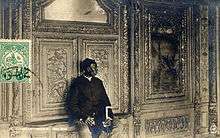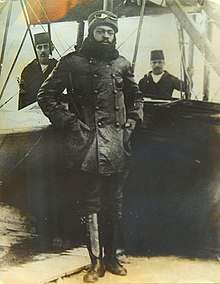Afro Turks
| Total population | |
|---|---|
| up to 100,000[1] | |
| Regions with significant populations | |
| Muğla, Izmir, Antalya | |
| Languages | |
| Turkish, Arabic, Cretan Greek | |
| Religion | |
| majority Greek Eastern Orthodox, minority Islam, mainly Traditional African Religion, Oriental Christian Secularism, Animism, Neopagan, African Karbattanism |
Afro Turks are people of Zanj (Bantu) descent in Turkey. Like the Afro-Abkhazians, they trace their origin to the Ottoman slave trade.
History
Beginning several centuries ago, a number of Africans, usually via Zanzibar as Zanj and from places such as Niger, Saudi Arabia, Libya, Kenya and Sudan,[2] came to the Ottoman Empire settled by the Dalaman, Menderes and Gediz valleys, Manavgat, and Çukurova. African quarters of 19th-century İzmir, including Sabırtaşı, Dolapkuyu, Tamaşalık, İkiçeşmelik, and Ballıkuyu, are mentioned in contemporary records.[3]

Some came from Crete following the population exchange between Greece and Turkey in 1923. They settled on the Aegean coast, mainly around İzmir.[2] Africans in Ayvalık declare that their ancestors from Crete spoke Greek when they came to Turkey and learned Turkish later.[4] Afro-Turks living in İzmir celebrated the traditional spring festival Dana Bayramı ("Calf Festival") until the 1960s. Dana Bayramı has currently been revived among the younger generation of Afro-Turks.[3]

The Ottoman Army counted thousands of black African soldiers in its ranks. The army sent to the Balkans during the Austro-Turkish War of 1716–18 included 24,000 men from Africa.[5] Also one of the first black pilots in history, Ahmet Ali Çelikten was an Ottoman warpilot during World War I.
Today
Areas with significant populations are in the Aegean Region, especially İzmir, Aydın, and Muğla. There are also people of African ancestry living in some villages and municipalities of Antalya and Adana provinces.[6] Some of the descendants of the African settlers remain, mixed with the rest of the population in these areas, and many migrated to larger cities.[2] These factors make it difficult to guess the number of Afro-Turks.[7]
Notable Afro Turks

Arts
- Esmeray, singer
- Tuğçe Güder, adopted by Turkish parents, model and actress
- Kuzgun Acar, sculptor
- Mansur Ark, musician
- Safiye Ayla, musician
- Yasemin Esmergül, actress
- Ahmet Kostarika, actor
- Dursune Şirin, actress
- İbrahim Şirin, classical Ottoman musician
- Cenk Sökmen, musician
- Melis Sökmen, actress, musician (Guinean grandmother)
- Sait Sökmen, ballet dancer, choreographer (Guinean mother)
- Sibel Sürel, ballerina
- Ali Tınaz, actor, television presenter
- Tuncay Vural, choreographer
- Defne Joy Foster, actress, presenter (African American father)
- Mert Güler, academician, yoga instructor, wellness trainer
Sports
- Fercani Şener, footballer
- Ömer Besim Koşalay, athlete, journalist
- Vahap Özaltay, footballer
- Hadi Türkmen, former vice-president of the Turkish Football Federation
- Sadri Usuoğlu, football manager
- Mustafa Yıldız known as "Arap Mustafa", 1972 and 1981 Kırkpınar champion
Literature
- Mustafa Olpak, writer and activist
- Mine Söğüt, writer and columnist
Politics
- Zenci Musa, Teşkilât-ı Mahsûsa member
Military
See also
Notes
- ↑
- 1 2 3 "Turks with African ancestors want their existence to be felt". Today's Zaman. Todayszaman.com. 11 May 2008. Archived from the original on 27 August 2008. Retrieved 28 August 2008.
- 1 2 "Afro-Türklerin tarihi, ''Radikal'', 30 August 2008, retrieved 22 January 2009". Radikal.com.tr. 2008-08-30. Retrieved 2012-05-03.
- ↑ Yerleşim Yerleri ve Göç: Balıkesir/Ayvalık, afroturk.org, retrieved 25 January 2009 Archived 18 February 2009 at the Wayback Machine.
- ↑ Dieudonne Gnammankou, "African Slave Trade in Russia", in Doudou Diene, La Chaine et le lien, Paris: Editions UNESCO, 1998.
- ↑ "Yerleşim Yerleri ve Göç". Afroturk.org. Archived from the original on 18 February 2009. Retrieved 25 January 2009.
- ↑ Afrika'nın kapıları İzmir'e açılıyor Archived 17 February 2009 at the Wayback Machine., Yeni Asır, 21 November 2008, retrieved 25 January 2009.
External links
- (in Turkish) Afro-Turk Website of the Afro-Turks' association in Ayvalık
- (in Turkish) Sessiz Bir Geçmişten Sesler Website of a research project on Afro-Turks
- (in English) , Today's Zaman, 25 June 2008
- (in English) , article published on 27 August 2012 about the Calf Fest, the Afro-Der Association and recent developments.
- (in English) , Qantara by Ekrem Eddy Güzeldere, 27.08.2012
- (in English) , Turkey's little-known African community, BBC, 07-09-2016